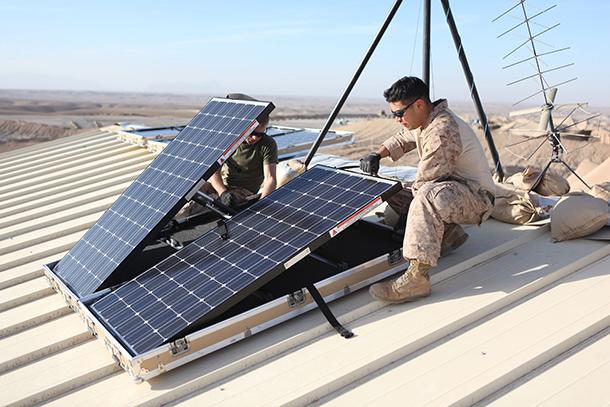Energy efficiency is becoming an essential tactic for the US military
On a combat outpost in Afghanistan in November 2012, two corporals in the US Marine Corps installed solar panels to provide power to radios, laptops and computers.
The US military sees climate change as a national security threat. So, it’s finding ways to adapt to global warming, to make the armed forces stronger and more flexible.
For starters, green technologies such as solar "blankets" and hybrid vehicles have improved operations within the Marine Corps and the Navy, according to Capt. Jim Goudreau, who served as a deputy assistant secretary of the Navy. He spent over two decades in the supply corps and is now the head of climate at Novartis.
The US military burns over 1.25 billion gallons of fuel a year, and the Department of Defense is the country's single largest consumer of fossil fuels, according to Goudreau. “When you talk climate issues, you can talk mitigation or adaptation. Every single gallon of fuel that we burn is carbon going into the atmosphere," he says.
That has an impact on the climate, which then "drives operational tempo as we respond to more disasters as a result of weather events [and] as we respond to regional insecurity and instability, which then, of course, drives greater fuel consumption, putting more carbon into the atmosphere."
It's a cycle that feeds itself. But at some point, "we've got to break that, and we've got to break our dependency on fossil fuels.”
Climate change itself doesn't create conflict or wars, but it is a “threat multiplier,” Goudreau says. “[Climate] changes conditions that will lead to greater chances of physical conflict and certainly will lead to tension over resource scarcity.”
“Given competition for resources, if that becomes an issue for your survival, that becomes conflict,” he continues. “And all too frequently, the US is involved in trying to help mediate that conflict or resolve that conflict, and so it changes where we operate and what conditions are.”
At one point in his career, Goudreau handled the logistics support for the US Navy’s amphibious 7th Fleet, which covers an area from Hawaii to Pakistan and Vladivostok down to the Antarctic.
“Trying to move fuel to all of those ships and all those Marines in a theater that large is incredibly complex,” he says. “If everything goes perfectly well, it's a tough day, to make things happen on schedule. If the slightest thing goes wrong, then you miss replenishments.”
In 2010, the US Marine Corps created the Experimental Forward Operating Base demonstrations, which integrated renewable energy sources into three units in Afghanistan. The Corps was able to completely reduce the need for fuel resupply in two of those units, Goudreau says. “They carried mobile solar units and hooked up their computers, their radios and their artillery targeting software to solar arrays that had battery storage, and they were able to fight the fight on a daily basis without moving liquid fuel in."
“In real terms, that means a young Marine didn't have to go into harm's way simply to move fuel to that forward operating base,” he explains. “The Marine Corps recognizes that the enemy knows that we need fuel and, if they can interrupt [our] supply, then that gives them an advantage … Renewables themselves give, in the Marine Corps’ case, greater agility, greater speed and greater self-sufficiency.”
Goudreau anticipates that the new Secretary of Defense Gen. Jim Mattis will continue to embrace the move toward energy efficiency. While Mattis was head of US Central Command, he “made a very strong push with his troops to focus on operational energy — to understand what they were consuming, what benefit they got operationally from it and to try to reduce vulnerabilities by using less fuel,” he says.
Goudreau believes that continued scientific research is “incredibly important” to the US armed forces.
“It's the foundation for our capability,” he says. “It serves as a foundation for forecasting into the future. Just simply technology development. Nuclear propulsion. We wouldn't have the fleet and the capabilities that we have today if the government had not made significant investments in basic science, basic research and development and applied science."
For example, without investing in satellites, "we wouldn't have the weather forecasting technology that we have today that's critical to safe operations at sea. We wouldn't have GPS, which is critical to operations all over the globe for the US military.”
“So, I would say that [science] serves as the foundation for our capability and will continue to serve as the foundation and absolute requirement for our continued operations,” he adds.
This article is based on an interview that aired on PRI’s Living on Earth with Steve Curwood.
